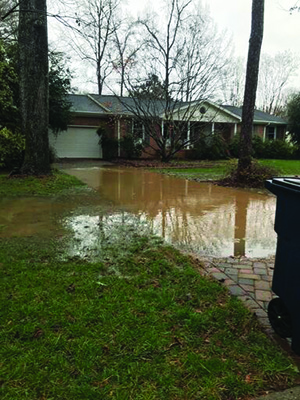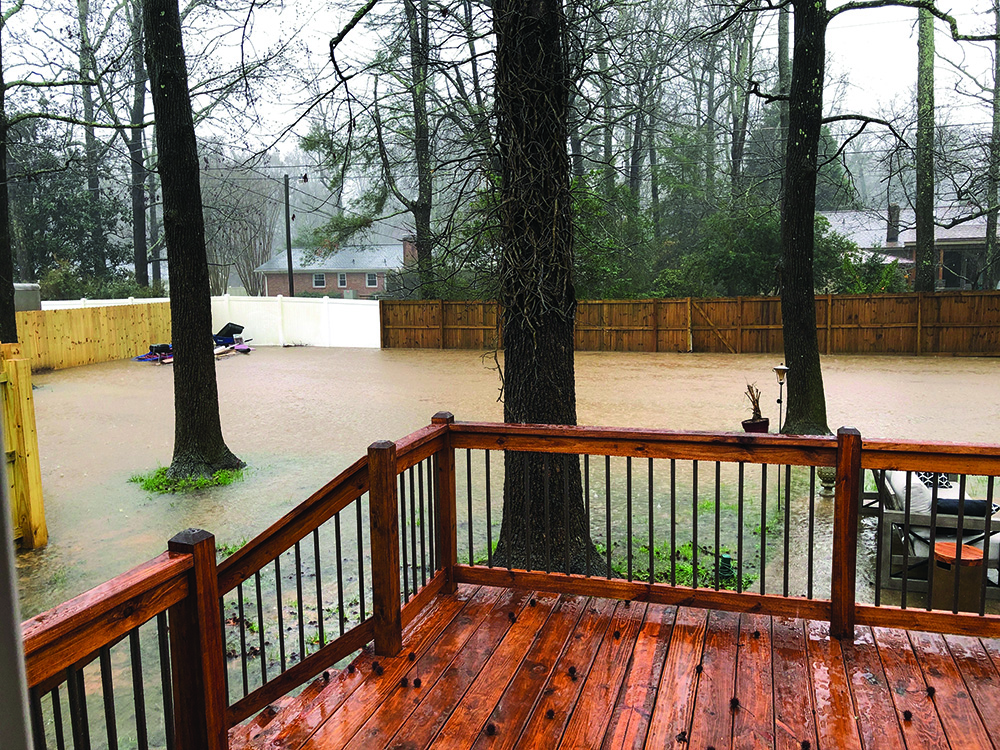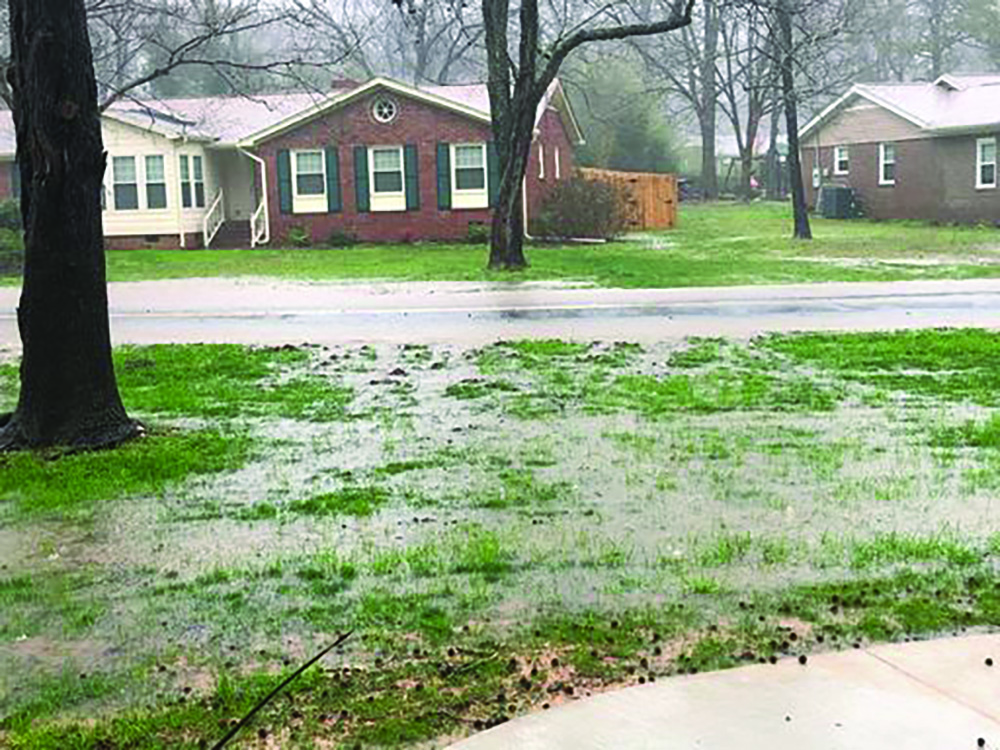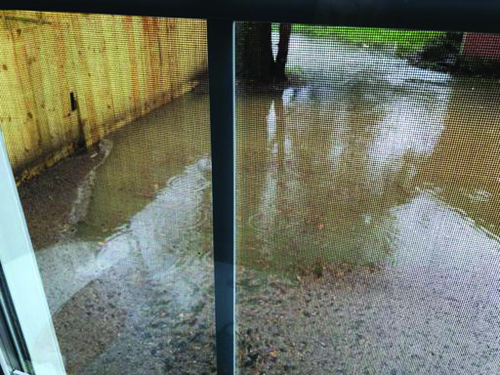
The sight of heavy rain and flooding shook residents of Simpsonville’s Poinsettia neighborhood in January and February this year. Roads turned into rivers, yards into ponds and pools of water gathered in homes. Local business owner of Sound Hearing Care, Jennifer Waddell, and four of her Poinsettia’ neighbors experienced severe damage to their homes. Improper drainage systems in the community caused $40,000 in total of repairs for all four local families, which were out-of-pocket costs. Multiple attempts were made by the homeowners to contact council members to fix the problem. The response to citizen complaints has been a long lingering silence for the most part. Sounds of raindrops on rooftops continued to be loud and alarming for neighbors. Desperate for help, Waddell reached out to Simpsonville’s Mayor, Paul Shewmaker. Though he responded quickly, Waddell states Shewmaker claims the city isn’t responsible for fixing the storm drainage.
Note from the Mayor:
“I know some residents in Poinsettia are unhappy with the
position the City holds. It’s a complicated issue that doesn’t have simple answers.” Regarding council members being
unresponsive Mayor Shewmaker said, “I do my best to be
accessible and a straight shooter. I’m not the kind of person who will duck your calls, hide behind the staff, or lose your emails–even when the answer isn’t the one you wanted to hear.”
At the end of Aster Drive, there’s one drain at the end of the street and five streets flowing into it with non-existent curbs. The curb is less than three inches tall due to the road being repaved on two occasions. None of the roads can hold the surface water and rain has flooded yards, driveways and the end of Aster Drive. It’s also almost knocked down fences! This isn’t the first time it’s happened. It’s been a continuous problem for families in the area. In 2016, one family begged and pleaded for officials to raise the curb. Eventually, they did raise the curb but only in front of one person’s home. This caused more flooding into Waddell’s yard. She explains, “I complained in January 2019. The city administrator and road’s manager came to my home. A cost estimate was made to evaluate the repair and they chose to do nothing.” Meanwhile, Waddell and her two children huddled in their house while the torrential downpour soaked their crawl space. Their backyard became a pond and their street was a river of rushing water. It took several days for the yard and street to completely dry out. The retention pond remained full. Clean up has buried their heads under water in substantial expenses including replacing rotten wood, two sump pumps and the purchase of a commercial dehumidifier. Waddell mentions the collective costs from the parties involved, “Over $40,000 has been spent to prevent water from destroying homes.”
About a year ago, Waddell moved into the home and noticed the problem. Since then, she reached out to councilman, Matt Gooch, three different times but he never returned her phone call. She reveals, “The only way I got him to call me back was I called his business as a customer.” Still in serious need of assistance, she decided to present a PowerPoint presentation at a council meeting. It consisted of photos of the flooding, dysfunctional drainage areas, damage and the South Carolina Code of Laws stating when the municipality is responsible for damages:
SECTION 5-31-450: Drains for surface water.
“Whenever, within the boundaries of any municipality, it shall be necessary or desirable to carry off the surface water from any street, alley or other public thoroughfare along such thoroughfare rather than over private islands adjacent to or adjoining such thoroughfare, such municipality shall, upon demand from the owner of such private lands, provide sufficient drainage for such water through open and covered drains, except when the formation of the street renders it impracticable, along or under such streets, alleys or other thoroughfare in such manner as to prevent the passage of such water over such private lands or property. But if such drains cannot be had along or under such streets, alleys or other thoroughfare, the municipal authorities may obtain, under proper proceedings for condemnation on payment of damages to the landowner, a right of way through the lands of such landowner for the necessary drains such as drainage. If any municipal corporation in this State shall fail or refuse to carry out the provisions of this section, any person injured thereby may have and maintain an action against such municipality for the actual damages sustained by such person.”
Paul Shewmaker
After the presentation, Waddell explains, “The Mayor has reached out to me since the meeting and asked for the information on the code requiring them to do the repair. He said he will have their attorney review everything.” As Waddell awaited a response, she shares her frustration; “The city hasn’t listened to us and modified the roads in an appropriate way. All I can hope for with new management is proper review of the problem, and they’ll fix it before it damages our homes permanently.” However, when Waddell heard back from Shewmaker, she received disheartening news. During a phone conversation, Waddell recalls Shewmaker stating the city has a policy that they’re not responsible for the storm water. She also comments he mentions homeowners should have to pay for that and if they fix hers, they’d have to fix everyone else’s. Or the state would have to come up with the money to fix it. This left Waddell confused. After all, the city did approve the drains, so if it’s not adequate Waddell believes that’s on them. Not to mention that with all the new businesses coming into the area, why wasn’t there enough money in the budget to fix the problem? Most importantly, the South Carolina Code of Law SECTION 5-31-450 states, “such municipality shall, upon demand from the owner of such private lands, provide sufficient drainage for such water through open and covered drains. If any municipal corporation in this State shall fail or refuse to carry out the provisions of this section, any person injured thereby may have and maintain an action against such municipality for the actual damages sustained by such person.” Waddell even took it a step further and provided research on ways the city of Simpsonville could get funding for it, but she mentions, “They said, we don’t think that will work.” Every time she thought she found the answer, she was up the creek without a paddle.
Following the phone conversation, Shewmaker sent Waddell the city’s Storm Water Facility Policy:
“The City maintains ONLY the portion of storm drainage facilities that are within city street rights-of-way. The City maintenance of storm drainage facilities within city rights-of-way is to maintain streets free of storm water that may render streets unsafe for vehicular travel. Storm drainage facilities within State rights-of-way are maintained by the State Department of Transportation (SCDOT). City policy prohibits City personnel from performing maintenance on storm drainage facilities on private property (outside street rights-of-way or easements). The City does not own the pipes, catch basins, etc. nor does the City own the rights-of-way or easements for these systems. It does not matter whether there is a drainage easement across the property because the City does not own the easement.
For the same reasons, the City does not maintain creeks or streams flowing through the City. Therefore, it is the responsibility of the property owner to maintain any storm drainage facility on their property.”
A little further investigation led to the discovery that SCDOT only performs drainage work on state maintained roads and Aster Drive does not fall in that category. A Greenville County representative also shares they aren’t liable for fixing the drainage problem and Aster Drive falls within the city of Simpsonville’s responsibility. The city of Simpsonville’s Storm Water Facility Policy clearly states they aren’t liable for storm drainage. It seems all parties are pointing in a different direction. No matter who’s at fault, Waddell believes law trumps policies. Since their policy has excused inaction, Waddell has decided to take legal action.
Sometimes when it rains, it pours. While Waddell hopes she won’t have to get a lawyer involved, it appears that’s the only way to uncover justice. If other Simpsonville citizens would like to join the fight, Waddell encourages them to call her at 864-315-9555.
Either way, homeowners in Poinsettia neighborhood are ready for some sunshine. ♣




